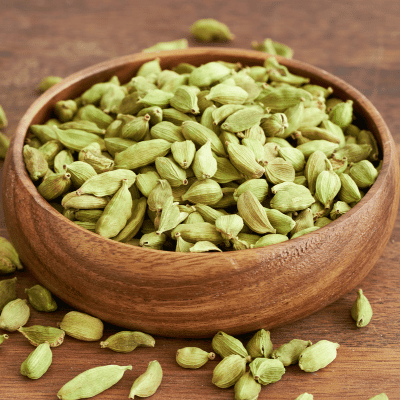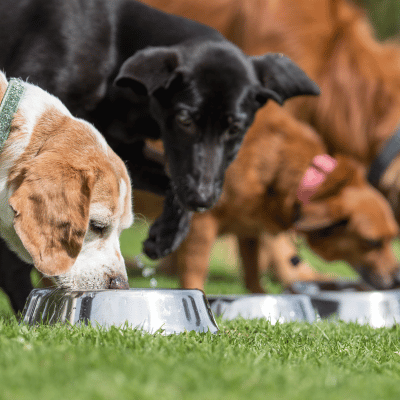Can Dogs Have Cardamom? An Essential Guide for Pet Owners
Cardamom, a spice beloved in many culinary traditions, has piqued the curiosity of pet owners around the world. Known for its aromatic flavor and various health benefits in humans, cardamom is often considered a potential addition to a dog’s diet. However, as with any new food or spice, it’s essential to understand the implications of giving cardamom to your dog. This blog explores whether dogs can have cardamom, the potential benefits and risks, and how to safely incorporate it into their diet.
 What is Cardamom?
What is Cardamom?
Cardamom is a spice that originates from the seeds of plants belonging to the ginger family. Native to India and other parts of South Asia, cardamom has been a staple in traditional medicine and culinary practices for centuries. It is commonly used in cooking to add flavor to both savory and sweet dishes, and it’s known for its distinctive, slightly sweet, and spicy taste.
Health Benefits of Cardamom for Humans
Cardamom is rich in essential oils, vitamins, and minerals that offer several health benefits. For humans, it aids digestion, helps in reducing inflammation, and even acts as a breath freshener. These benefits have led some dog owners to wonder if cardamom could be equally beneficial for their furry friends.
Can Dogs Eat Cardamom?
The short answer is yes, dogs can eat cardamom, but with caution. While cardamom is not toxic to dogs, it should be given in moderation. According to veterinarians and pet nutrition experts, cardamom can be a safe and healthy addition to a dog’s diet, provided it’s introduced carefully and in small amounts.
Moderation is Key
When introducing any new spice or food to your dog’s diet, moderation is crucial. Overconsumption of cardamom could lead to gastrointestinal issues such as vomiting or diarrhea. Therefore, it is advisable to consult with a veterinarian before adding cardamom or any other spice to your dog’s diet.
Potential Health Benefits of Cardamom for Dogs
Just like in humans, cardamom may offer several health benefits for dogs when given in appropriate amounts.
Digestive Aid
Cardamom is known for its digestive properties, which can help reduce bloating and gas in dogs. If your dog struggles with digestive issues, a small amount of cardamom might help ease their discomfort.
Immune System Support
Cardamom contains phytochemicals that can help boost the immune system. These compounds have anti-inflammatory and antioxidant properties, which may help support your dog’s overall health.
Breath Freshener
Another potential benefit of cardamom for dogs is its ability to freshen breath. The aromatic spice can help reduce bad breath in dogs, making those close-up cuddles a bit more pleasant.
Risks and Side Effects of Cardamom for Dogs
While cardamom has its benefits, there are also potential risks to be aware of.
Overconsumption
One of the primary risks associated with cardamom is overconsumption. Giving your dog too much cardamom can lead to gastrointestinal distress, including symptoms like vomiting, diarrhea, and stomach pain.
Allergic Reactions
Although rare, some dogs may have an allergic reaction to cardamom. Signs of an allergic reaction include itching, swelling, and difficulty breathing. If your dog shows any of these symptoms after consuming cardamom, contact your veterinarian immediately.
 Gastrointestinal Distress
Gastrointestinal Distress
Even in small amounts, some dogs might not tolerate cardamom well, leading to stomach upset. It’s important to monitor your dog after introducing any new food or spice and to stop giving it to them if they show signs of discomfort.
Safe Ways to Introduce Cardamom to Your Dog’s Diet
If you decide to give cardamom to your dog, it’s essential to do so safely.
Start Small
Begin by sprinkling a tiny amount of ground cardamom on your dog’s food or mixing it into their treats. Observe how your dog reacts to it over the next 24 hours.
Consult Your Veterinarian
Before adding cardamom to your dog’s diet, consult with your veterinarian, especially if your dog has pre-existing health conditions or is on medication.
Monitor Your Dog
After introducing cardamom, keep a close eye on your dog for any signs of allergic reactions or gastrointestinal issues. If your dog seems to tolerate cardamom well, you can continue to give it to them in small amounts.
When Should You Avoid Giving Cardamom to Your Dog?
While cardamom can be beneficial, there are certain situations where it should be avoided.
Health Conditions
Dogs with certain health conditions, such as gastrointestinal disorders or allergies, may not tolerate cardamom well. It’s crucial to consult with a veterinarian before introducing any new spice to their diet.
Puppies and Elderly Dogs
Puppies and elderly dogs may be more sensitive to spices like cardamom. Their digestive systems are often less robust, making them more susceptible to gastrointestinal issues.
Medication Interactions
Cardamom may interact with certain medications, potentially reducing their effectiveness or causing adverse reactions. Always check with your veterinarian if your dog is on medication before giving them cardamom.
Alternative Spices and Herbs Safe for Dogs
If cardamom isn’t suitable for your dog, there are several other dog-friendly herbs and spices that can offer similar health benefits:
Ginger
Ginger is well-regarded for its anti-nausea properties, making it an excellent option for dogs experiencing motion sickness or digestive upset. It can help soothe an upset stomach and improve digestion. Ginger is generally safe in small quantities, and it’s often used in homemade dog treats or as a supplement.
Turmeric
Turmeric is known for its powerful anti-inflammatory and antioxidant properties. This bright yellow spice can be beneficial for dogs with joint issues, such as arthritis, as it may help reduce inflammation and improve mobility. Turmeric can be sprinkled on your dog’s food in small amounts, but it’s important to consult with your vet to ensure it’s appropriate for your dog’s specific needs.
Parsley
Parsley is a versatile herb that can help freshen your dog’s breath and support their overall health. It’s rich in vitamins, minerals, and antioxidants, which can contribute to a healthy immune system. However, be mindful to use curly parsley rather than the potentially toxic flat-leaf variety.
Before adding any new spice or herb to your dog’s diet, it’s essential to consult with your veterinarian. While these spices and herbs can offer health benefits, each dog is different, and what’s beneficial for one dog may not be suitable for another.
Expert Opinions and Vet Advice
 Veterinarians and pet nutrition experts agree that while cardamom can be safe for dogs, it should be given in moderation. Dr. Jane Smith, a renowned veterinarian, advises, “Always consult with your veterinarian before introducing any new food or spice to your dog’s diet. Each dog is different, and what works for one may not work for another.”
Veterinarians and pet nutrition experts agree that while cardamom can be safe for dogs, it should be given in moderation. Dr. Jane Smith, a renowned veterinarian, advises, “Always consult with your veterinarian before introducing any new food or spice to your dog’s diet. Each dog is different, and what works for one may not work for another.”
The importance of professional guidance cannot be overstated. Before making any changes to your dog’s diet, it’s essential to seek advice from a qualified veterinarian.
In summary, cardamom can be a safe and beneficial addition to your dog’s diet when given in moderation. It may offer digestive support, boost the immune system, and freshen breath. However, it’s crucial to consult with your veterinarian before introducing cardamom to ensure it’s the right choice for your dog’s individual health needs.
Contact Us for Any Professional Support for Your Pe
At Scoopology Poop Removal, we care about your pets’ health and well-being. If you have any questions about your dog’s diet or are concerned about their health, don’t hesitate to reach out to us. Our team is here to help you make informed decisions about your pet’s care.
Call Today: (360) 743-3926
Servicing Kitsap, Grays Harbor, Thurston, Mason, Pierce, and King Counties.
Get an Instant Quote for our services and let us help you maintain a clean and healthy environment for your furry friends.
FAQ
Can cardamom be used to treat specific dog ailments?
Cardamom may help with digestive issues such as bloating and gas. However, it should not be used as a primary treatment for any medical condition without consulting a veterinarian.
What should I do if my dog accidentally eats too much cardamom?
If your dog consumes a large amount of cardamom, monitor them for signs of gastrointestinal distress such as vomiting or diarrhea. Contact your veterinarian immediately if your dog shows any symptoms of an allergic reaction or other adverse effects.
How much cardamom can I give to my dog?
Start with a very small amount, such as a pinch of ground cardamom, and consult your veterinarian for specific dosage recommendations based on your dog’s size and health condition.

